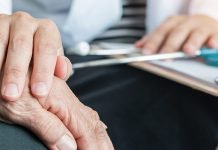Parkinson’s disease is a neurological disease that affects, as one starts aging. It has no particular reason to occur, nor does it have a set of defined symptoms, that alerts a potential patient. Parkinson’s disease mainly is a neurodegenerative disorder that predominantly affects the dopamine producing neurons, thereby affecting an individual’s central nervous system.
It mainly is a disorder that is marked with age, and cannot be cured but can be treated. As the disease progresses, the patient begins to progressively lose his motor skills thereby impeding movement. Moreover, later stages of the disease lead to other neurological concerns, mainly due to the lack of dopamine secretion; including chemical imbalance, depression, drastic mood swings, irritability, etc.
People who face Parkinson’s disease face a lot of difficulties that tend to affect their day to day life. The most common symptoms that are found are shivering, shaking of limbs, fatigue and decreased motor coordination. The degradation of motor skills puts a huge toll on the person, because it alters basic skills such as walking, holding things that often, we humans take as granted. Early signs of the disease can include many uncontrollable movements, not just occasionally, but on a regular basis as well.
All this can have a significant impact on ones day-to-day lifestyle. Basic tasks like eating, driving, walking, writing, etc. begin to require assistance. Thus, in short, Parkinson’s disease can alter your family relations, how one exercises, eats, works and moves. But these changes do not happen immediately, and one can take steps to minimize the long term affects.
Parkinson’s therefore is a progressive disease, which means that it will not hamper one’s lifestyle immediately. With respect to work, one does not need to stop right after diagnosis. If carefully managed, treatment and support from ones employer can enable the patient to work for years.
Common Motor Symptoms in Parkinson’s:
Motor skill related disabilities due to Parkinson’s disease is sort of a given. Since PD directly affects the central nervous system of the individual, and reduces the impact of the part of the brain that controls motor skills, physical ailments are second nature to PD. Parkinson’s causes muscle rigidity, soreness, and muscular dystrophy, etc.
Thus, it is obvious that as the patient develops PD, performing day to day tasks slowly becomes tougher. In order to avoid rapid degradation of health, a PD patient can take a few precautions to delay the side effects. They are healthy diet and exercise. Good nutrition and exercise help stimulate the body and brain, and also encourages the supply of fresh blood and hormones to the brain. Basic everyday tasks like eating, driving, walking, writing, begins to require assistance.
Common symptoms are:
- Bradykinesia: refers to slowness of movement and is one of the cardinal manifestations of Parkinson’s disease
- Tremors
- Rigidity
- Cramping: repetitive twisting or tightening of muscles
- Drooling: while not always viewed as a motor symptom, excessive saliva or drooling may result due to a decrease in normally automatic actions such as swallowing.
While all these are common symptoms of Parkinson’s, it is important to know why these occur. Thus the next important question is:
What causes Parkinson’s Movement Symptoms?
Dopamine is a chemical messenger or neurotransmitter, which is primarily responsible for controlling movement, emotional responses and the ability to feel pleasure and pain. In people with Parkinson’s, the cells that make dopamine are impaired. As Parkinson’s progresses, more dopamine-producing brain cells die. Your brain eventually reaches a point where it stops producing dopamine in any significant amount. This causes increasing problems with movement.
Parkinson’s is a neurological disease, it has emotional impacts too. Since it is closely linked to dopamine secretion, there are several non-motor/ non-movement skill related symptoms that occur, they are:
Mental Disabilities due to Parkinson’s disease:
Studies show that there is a great deal of interconnection between the decline of mental health and Parkinson’s disease; the psychotic disorders and cognitive decline. Parkinson’s disease is largely known to be a movement disorder. But that is just the headline that everyone keeps talking about. Under the table, there is a huge aspect of many non-motor symptoms which only the patients experience and neurologists try to put forward. But due to the lack definite evidence, many of the additional factors related to the mental health are often ignored in Parkinson’s disease. PD is mainly known as physical disorder that may lead to mental side effects.
Depression
Depression is the most common mental disability associated with Parkinson’s disease. It is said that the patient will face it either at the onset of PD or in the latter half. Depression and PD both follow a vicious cycle of influencing one another.
Sleeping Disorders:
PD patients often develop sleeping disorders due to the negative impact it has on the lifestyle of the patient. Sleeping disorders due to Parkinson’s disease can manifest in the form of nocturnal sleep disturbance; sleep related movement disorders and parasomnias. PD patients also tend to develop insomnia.
Impulsive Compulsive Disorder:
Many readings show high rate of Impulsive-Compulsive Disorder in PD patients. These conditions arise from abnormal or disproportionate Dopamine receptor stimulation. Once triggered the ICD stay for lifetime and can only be controlled with medication and therapy to some extent.
In conclusion, Parkinson’s Disease itself is classified as a disability, it causes cognitive and motor skill impairment. Though there are no disabilities that further arise out of PD, the symptoms it produces more or less can be regarded as additional disabilities. It is essential to maintain good health and undergo regular check up’s especially to keep cognitive disorders at bay.
Parkinson’s disease is much easier to deal with if one follows adequate safety tips and takes care of their general health- apart from medical care and therapy, personal care helps improve lifestyle.


















